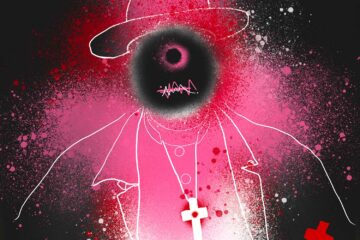Overview: Sara Meghdari, an interdisciplinary artist based in Brooklyn, NY., is Iranian and American. She comes from a family that honors two religions, two languages and two cultures. We talked as protests grew across the United States after police officers in Minneapolis killed George Floyd. This, on top of months of dealing with extraordinary upheaval and isolation due to the Covid-19 pandemic.
We talk about the real, experienced impact on a human when being treated as “other,” differences between life in Iran and the U.S., and how they don’t play out the way many Americans assume. We talk politics and racism, and the responsibility of each of us to be curious, to self-educate and not just swallow what the media and culture feed us. Sara also shares how her creative work serves as a coping mechanism, and a process of healing and counteracting stereotypes placed on her and those who likewise come from Iran, or elsewhere in that region of the world.
These things and more in this episode of the Humanitou Podcast.
INTRO TRANSCRIPT
Hi. I’m Adam Williams, creator and host of Humanitou, a podcast that empowers connection through conversations of humanness and creativity.
Today, I’m talking with Sara Meghdari, an interdisciplinary artist based in Brooklyn, NY. Sara is Iranian and American. She comes from a family that honors two religions, two languages and two cultures.
Sara and I talked as protests grew across the United States after police officers in Minneapolis killed George Floyd. This, on top of months of dealing with extraordinary upheaval and isolation due to the Covid-19 pandemic.
Sara was not sure she wanted to talk with me. She told me she has a sense of mistrust toward, in particular, white men. On the other hand, Sara has important and valuable perspectives to share, and she wants to share them. So she decided she was willing to talk with me. She also was willing to put me in my place, should the need arise.
In our conversation, we talk about:
- The real, experienced impact on a human when being treated as “other”
- Differences between life in Iran and the U.S., and how they don’t play out the way many Americans assume. And why Sara actually felt more of a sense of individuality and freedom while living in Iran, and feels more oppressed while living here in the United States
- Politics and racism, and the responsibility of each of us to be curious, to self-educate and not just swallow what the media and culture feeds us
We talk about a lot of other things, too, including how Sara’s creative work serves as a coping mechanism, and a process of healing and counteracting stereotypes placed on her and those who likewise come from Iran, or elsewhere in that region of the world
This conversation requires a willingness for many of us here in the U.S. to listen openly, and to reflect on what truths we’ve held about Iran and Iranians, the America and Americans. And in that way, this is a quintessential Humanitou conversation, and I’m so glad that Sara decided to share in it.
Here is my conversation with Sara Meghdari.
Episode 93 Show Notes
Connect with Sara Meghdari:
Sara’s website: szmeghdari.com
Sara on Instagram: @szmeghdari
Connect with Adam Williams / Humanitou:
Humanitou on Instagram: @humanitou
Subscribe: Humanitou Newsletter
Photography
Tiffany Smith: tiffanysmithphoto.com, @ms_ladyt
Intro/Outro Music
“Tupac Lives” by John Bartmann | freemusicarchive.org


